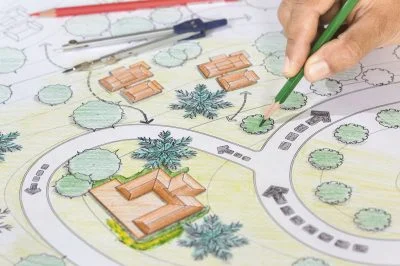Landscape Architecture Continuing Education

Landscape architecture is an ever-evolving profession that requires a constant pursuit of knowledge and skills. As a landscape architect, staying up-to-date with the latest industry trends and techniques is crucial for success in the field. This is where continuing education comes in.
Continuing education is a way for professionals to continue learning and improving their skills beyond the initial degree or certification. It provides opportunities to expand knowledge, learn new techniques, and stay current with the latest industry advancements. For landscape architects, continuing education is not only beneficial for personal and professional growth but also a requirement for maintaining licensure.
In this article, we will explore the world of landscape architecture continuing education. We will discuss the benefits of continuing education, the different types of programs available, and the requirements for maintaining licensure. We will also provide insights into popular topics, best practices for selecting programs, and resources for finding continuing education opportunities. Whether you are a seasoned professional or just starting in the field of landscape architecture, this blog will provide valuable information on how to continue your education and stay at the forefront of the industry.
Benefits of Continuing Education in Landscape Architecture
Continuing education in landscape architecture offers a variety of benefits to professionals in the field. The landscape architecture profession is constantly evolving, with new technology, trends, and best practices emerging regularly. In order to stay current and competitive in the industry, landscape architects need to continually update their knowledge and skills through continuing education. Here are some of the key benefits of continuing education in landscape architecture:
Staying up-to-date with industry trends and advancements
Continuing education allows landscape architects to stay current with the latest trends, technology, and best practices in the field. This knowledge helps professionals remain competitive and relevant in the industry.
Improving skills and knowledge
Continuing education provides opportunities for landscape architects to improve their skills and knowledge, and to learn about new techniques and approaches to landscape design. This can lead to improved job performance and greater career opportunities.
Maintaining professional credentials
Continuing education is often required for maintaining professional credentials, such as licensure. By fulfilling these requirements, landscape architects can ensure that they are in good standing with regulatory bodies and can continue practicing in the profession.
Overall, continuing education is an essential part of the landscape architecture profession. It allows professionals to remain current, improve their skills, and maintain their professional credentials, all of which are important for success in the field.
Types of Continuing Education Programs
There are various types of continuing education programs available for landscape architects, each offering unique benefits and opportunities for professional growth. Here are some of the most common types of continuing education programs in landscape architecture:
Online PDH Courses
Online PDH courses are a popular choice for continuing education in landscape architecture due to their convenience and flexibility. These courses can be accessed from anywhere with an internet connection and offer a variety of topics and course lengths to choose from.
Workshops and Seminars
Workshops and seminars are typically held in person and offer hands-on training and opportunities for networking with other professionals in the field. These programs often focus on specific topics or techniques and may be offered by industry associations, universities, or other organizations.
Conferences
Conferences are larger events that bring together professionals from across the industry to learn about new trends, best practices, and emerging technology in landscape architecture. These events often feature keynote speakers, breakout sessions, and opportunities for networking.
Professional Associations
Many landscape architecture professional associations offer continuing education programs to their members. These programs may include online courses, webinars, or in-person workshops and seminars.
Certificate Programs
Certificate programs offer a more structured approach to continuing education, often leading to a specific certification upon completion. These programs may be offered by universities, industry associations, or other organizations and may focus on a particular area of specialization in landscape architecture.
Self-Directed Study
Self-directed study involves reading industry publications, attending webinars, or other independent learning activities. While less structured than other types of continuing education programs, self-directed study allows professionals to focus on areas of interest and learn at their own pace.
In conclusion, there are various types of continuing education programs available for landscape architects, each offering unique benefits and opportunities for professional growth. Whether pursuing online courses, workshops and seminars, conferences, professional associations, certificate programs, or self-directed study, landscape architects can enhance their knowledge and skills to remain current and competitive in the field.
Requirements for Continuing Education in Landscape Architecture
Continuing education is an essential component of maintaining licensure for landscape architects. The requirements for continuing education can vary depending on the state or province in which a landscape architect is licensed, but there are some common requirements that are typically enforced across jurisdictions. Here are some of the most common requirements for continuing education in landscape architecture:
Credit Hour Requirements
Most licensing boards require a specific number of credit hours of continuing education to be completed within a specified time frame, typically every two to three years. The number of credit hours required may vary depending on the jurisdiction.
Content Requirements
Many licensing boards require that continuing education courses or programs cover specific topics, such as sustainability, accessibility, or ethics. This ensures that landscape architects are keeping up-to-date with important issues and best practices in the field.
Accreditation Requirements
In some jurisdictions, continuing education programs must be accredited by an approved organization, such as the American Society of Landscape Architects (ASLA), to count towards licensure requirements.
Reporting Requirements
Landscape architects are often required to report their completion of continuing education credits to their licensing board. This may involve submitting certificates of completion or other documentation.
Audit Requirements
Some licensing boards randomly audit landscape architects to ensure that they have completed the required continuing education credits. If audited, landscape architects must provide proof of completion for the audited period.
Overall, the requirements for continuing education in landscape architecture are put in place to ensure that professionals in the field are staying current with industry trends, best practices, and important issues. By meeting these requirements, landscape architects can maintain their licensure and continue practicing in the profession. It is important for landscape architects to check with their licensing board for specific requirements in their jurisdiction and to ensure that they are meeting these requirements on an ongoing basis.
Accreditation and Certification
These are two important aspects of continuing education in landscape architecture. Accreditation refers to the process of evaluating and recognizing a continuing education program or institution for meeting specific standards of quality and effectiveness. Certification, on the other hand, refers to the recognition of an individual’s knowledge and skills in a particular area of expertise.
Accreditation is typically voluntary and may be granted by professional associations, educational institutions, or other organizations. Accredited programs have been evaluated and determined to meet specific criteria related to curriculum, faculty, and resources. In landscape architecture, the American Society of Landscape Architects (ASLA) is a key organization that provides accreditation for continuing education programs.
Certification, on the other hand, is often required for certain specialized areas within landscape architecture. For example, individuals who specialize in sustainable design may choose to pursue LEED certification, which demonstrates their knowledge and skills in designing environmentally sustainable landscapes. Similarly, certification as a Certified Irrigation Designer (CID) or Certified Irrigation Contractor (CIC) demonstrates expertise in irrigation design and installation.
Certification programs typically involve a rigorous exam that tests an individual’s knowledge and skills in a specific area of expertise. To maintain certification, individuals must often complete continuing education credits on an ongoing basis.
Both accreditation and certification are important in the landscape architecture profession as they provide a means of ensuring quality and expertise within the field. Landscape architects should consider pursuing accreditation for continuing education programs they attend to ensure that they are receiving high-quality education that meets industry standards. Similarly, pursuing certification can demonstrate expertise and specialization within a particular area of landscape architecture, which can lead to greater career opportunities and professional recognition.
Popular Landscape Architecture Continuing Education Topics
Continuing education is an essential aspect of staying current in the ever-evolving field of landscape architecture. As the profession continues to grow and change, there are certain topics that are particularly popular among landscape architects seeking continuing education. Here are some of the most popular landscape architecture continuing education topics:
Sustainability
With a growing emphasis on sustainable design and environmental stewardship, many landscape architects seek continuing education on topics such as green infrastructure, regenerative design, and sustainable site development.
Technology
As technology continues to play an increasingly important role in landscape architecture, many professionals seek continuing education on topics such as Building Information Modeling (BIM), computer-aided design (CAD), and 3D modeling.
Accessibility
Landscape architects often seek continuing education on creating accessible and inclusive outdoor spaces that can be enjoyed by all members of the community, including those with disabilities.
Health and wellness
There is a growing focus on designing outdoor spaces that promote health and wellness, such as incorporating features that encourage physical activity or providing spaces for relaxation and stress relief.
Ethics
As with any profession, ethics are an important consideration in landscape architecture. Continuing education on ethics can help professionals to practicing in an ethical and responsible manner.
Cultural awareness and diversity
Landscape architects increasingly seek continuing education on designing outdoor spaces that are inclusive and sensitive to diverse cultures and communities.
Water management
With water scarcity becoming an increasing concern in many regions. Landscape architects seek continuing education on topics such as rainwater harvesting, storm-water management, and water-efficient design.
By seeking continuing education on these popular topics, landscape architects can stay up-to-date on important trends and best practices in the field, while also expanding their knowledge and skills.
Best Practices for Selecting Continuing Education Programs
Selecting the right continuing education program is a critical decision for landscape architects looking to advance their careers and stay current in the field. Here are some best practices for selecting the right continuing education program:
Consider your career goals
It’s important to consider your career goals and what skills and knowledge you need to achieve them. Consider whether you want
- To specialize in a particular area of landscape architecture
- Expand your overall knowledge in the field.
Research program options
Take the time to research different continuing education programs and their offerings. That align with your career goals and offer courses or workshops that cover topics you are interested in.
Check for accreditation
Accreditation is an important factor to consider when selecting a continuing education program. Accredited programs have been evaluated and determined to meet specific criteria related to curriculum, faculty, and resources. The American Society of Landscape Architects (ASLA) is a key organization that provides accreditation for continuing education programs.
Look for experienced instructors
Experienced and knowledgeable instructors are essential for a high-quality continuing education program. Instructors who have extensive experience in the field and a proven track record of teaching and mentoring landscape architects.
Consider online vs. in-person options:
Online continuing education programs offer the flexibility to learn on your own schedule. While in-person programs may offer more opportunities for networking and hands-on learning. Consider which format is best for your learning style and career goals.
Seek recommendations
Reach out to colleagues or professional organizations for recommendations on continuing education programs. Word-of-mouth recommendations can be a valuable resource for finding high-quality programs.
Landscape architects can select the right continuing education to meet their career goals, expand knowledge & skills in the field.




